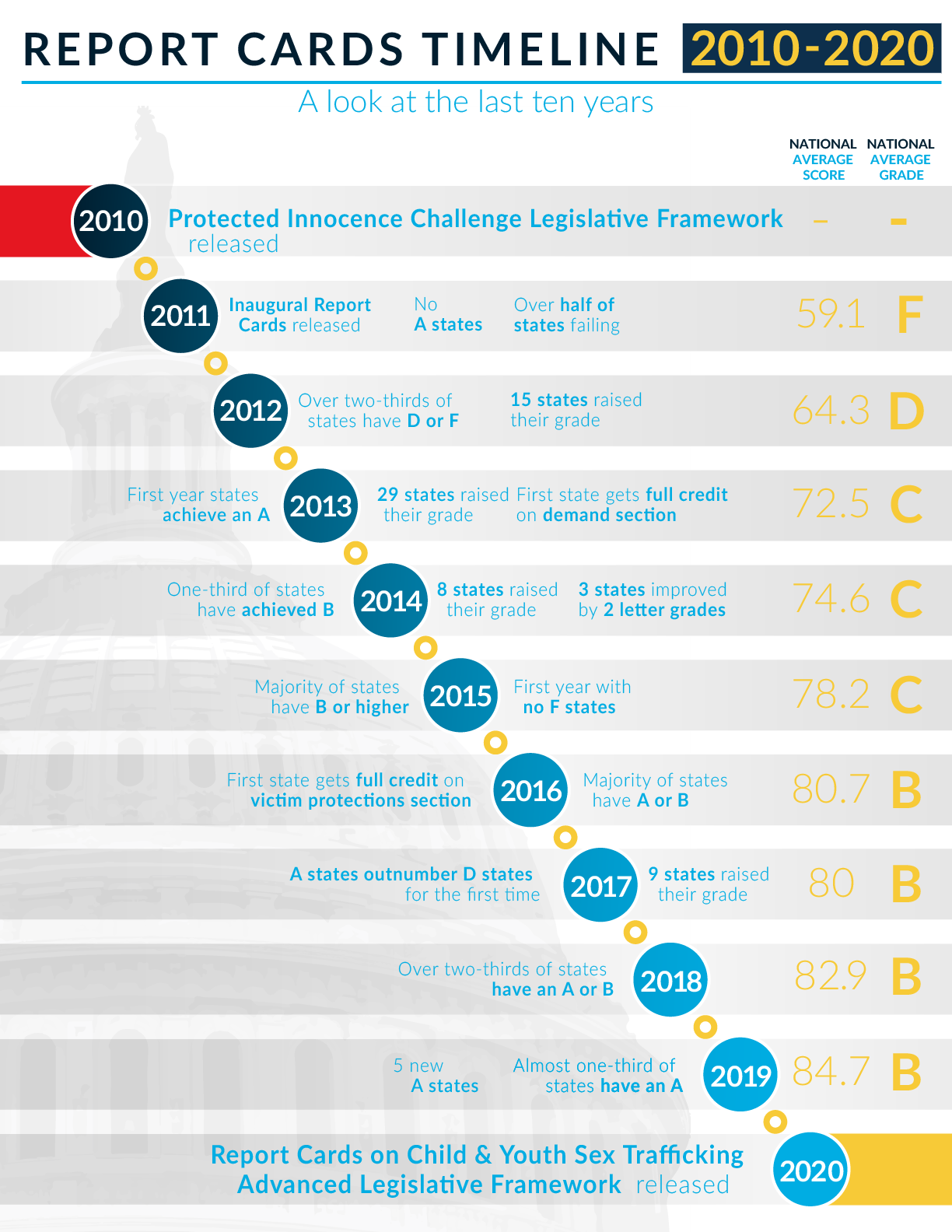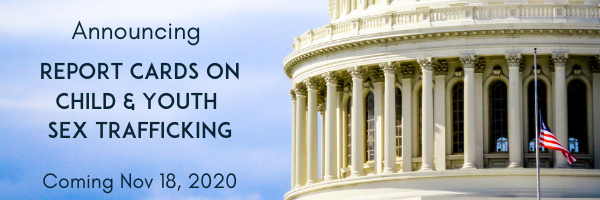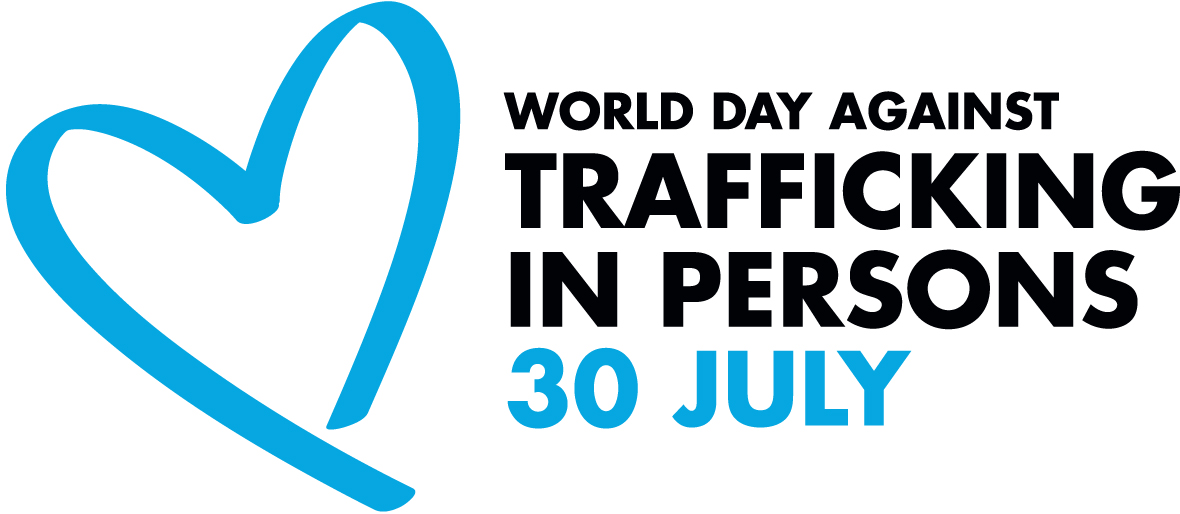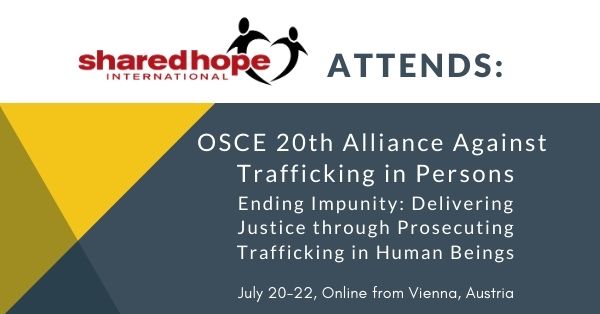Building on a decade of successful advocacy through the Protected Innocence Challenge, Shared Hope International’s Report Cards on Child & Youth Sex Trafficking will advance the standards for grading states on delivering legal solutions that address this vulnerable population.
Washington, DC, Nov. 18, 2020 – Since 1998, Shared Hope has worked to inspire lawmaking that brings justice and ensures protective responses to victims. Beginning in 2011, the organization leveraged its position as a nationally recognized leader in the fight to end domestic minor sex trafficking through the Protected Innocence Challenge–report cards grading states on the fundamental fabric of laws that address child sex trafficking. Now, Report Cards on Child and Youth Sex Trafficking will motivate states to move beyond fundamentals and consider effective protection and services. This project, announced on Wednesday, November 18, 2020 serves as the blueprint for the next phase in Shared Hope’s campaign for State Action. National Change. and the catalyst for stronger state legislation to protect commercially sexually exploited youth.
“When Shared Hope first issued state grades in 2011, 26 states earned failing grades. Many did not have a child sex trafficking law or make it a crime to buy sex with a child; today, just a decade later, all states have a child sex trafficking law and a legal framework for holding buyers of sex with children accountable” said Linda Smith, founder and president of Shared Hope. “Analyzing state laws for a decade revealed where gaps remain. Report Cards on Child and Youth Sex Trafficking addresses those gaps by shifting focus to the inadequate protections being provided to these survivors.” This video showcases the look towards the future.
With states playing a critical role in eradicating child and youth sex trafficking, the original framework sought to lay the foundation for transformational policy, practice, and culture change by advocating for laws that protect victims and hold perpetrators accountable. Through grassroots mobilization, legislative advocacy, technical assistance, and consistent collaboration, this vision has largely become a reality. Critical gaps in state laws have been addressed, with thirty-five states, and D.C., earning an “A” or “B” grade in 2019.
Looking towards the next decade, with the support of stakeholders, Shared Hope International will build on the strong legal foundation laid over the last 10 years to push states further, with a more robust focus on policies that strengthen victim protections and prioritize true prevention. This includes addressing and funding specialized services for victims as well as focusing on gaps in demand enforcement.
Report Cards on Child & Youth Sex Trafficking consists of 40 key points of law, grouped into six issue areas, that are needed under state law to provide a protective response to child and youth survivors of sex trafficking.
The six key issue areas are:
- Criminal Provisions: Clear criminal laws, including those that criminalize buyers of sex with children, are needed to ensure all sex trafficking offenders can be held accountable.
- Identification of and Response to Victims: State laws must identify all commercially sexually exploited children as victims of trafficking and provide for a protective, rather than punitive response.
- Continuum of Care: To break the cycle of exploitation, state laws must provide victims access to funded, trauma-informed services.
- Access to Justice for Trafficking Survivors: A range of civil and criminal justice remedies must be available for victims under the law.
- Tools for a Victim-Centered Criminal Justice Response: Criminal justice procedures for the benefit and protection of victim-witnesses must be provided under the law.
- Prevention and Training: To help prevent trafficking and promote just responses to child sex trafficking victims, training must be required by law for child welfare, juvenile justice, law enforcement, prosecutors and school personnel, and prevention education required for students.
“The past decade has led to new research and opportunities to listen to survivors, bringing ever-increasing clarity to laws and policies that must be in place to fully respond to child and youth sex trafficking,” said Smith. “At the core of this shift is stopping the victim-blaming that prevents children from being recognized as victims and accessing needed services. There is clearly much work to be done. Nineteen states still allow child victims to be charged with prostitution; in nineteen others the buyer can assert a defense that he didn’t know how old the child was; in nineteen more, buyers are not considered offenders under the child sex trafficking law. While we recognize changing laws to ensure greater protection for victims can be a heavy lift for states and providing services presents resource challenges, we’ve seen some states take the lead on this and we’re confident others will learn from their example.”
To stay up to date on this exciting project, sign up here to guarantee the Report Cards on Child and Youth Sex Trafficking will be delivered directly to you.
To support the implementation of this advanced framework, our Policy Team will remain available to provide rapid technical assistance to support legislators, advocates, and state agencies; technical assistance requests can be submitted here.
ABOUT SHARED HOPE INTERNATIONAL
Founded in 1998 by then U.S. Congresswoman Linda Smith, Shared Hope International strives to prevent the conditions that foster sex trafficking, promote restoration for survivors of sex trafficking, and bring justice to vulnerable women and children. A non-profit Christian organization, Shared Hope engages in diverse activities that confront sex trafficking in communities throughout America. Our efforts include training first responders and community members to identify warning signs of trafficking and employ intervention techniques to appropriately respond to child trafficking victims; providing restorative services to affected children and women; and offering legislative support to those focused on strengthening laws that fight child sex trafficking. Our vision is to coordinate a national U.S. network of protection to improve the response to victims of trafficking. We believe we can create a world where every survivor is surrounded by trained professionals, an alert community, just law and policy, knowledgeable service providers and appropriate shelter options.
MEDIA CONTACT: Mark Porter, Senior Director of Creative Strategies for Shared Hope International, mark@sharedhope.org, 202-963-2601 x408.














